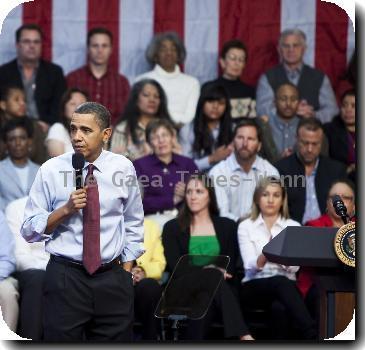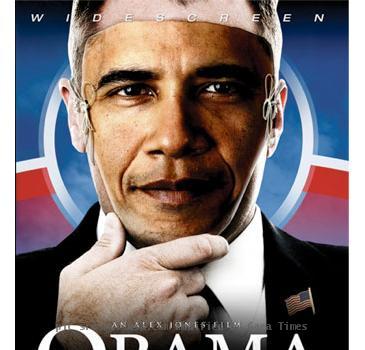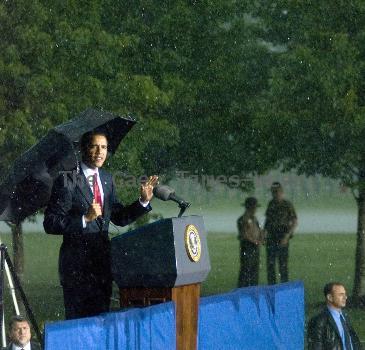Asia stops to remember end of World War II, prays for peace in tension-ridden region
By Yuri Kageyama, APSunday, August 15, 2010
Asia stops to remember end of World War II
TOKYO — Asia paused on Sunday to remember Japan’s surrender to the allied forces which ended World War II 65 years ago, as the Japanese prime minister apologized for wreaking suffering on the region and the South Korean president said Tokyo’s remorse was a step in the right direction.
From Nanjing — the site of a 1937 massacre by Japanese troops — to Tokyo’s Yasukuni Shrine, which has drawn outrage from Asia for honoring Class A war criminals, people prayed for the millions who died in war and expressed hopes for peace.
The reckoning with history has taken special meaning this year as it comes amid a global effort to realize a world without nuclear weapons, a resolve backed by President Barack Obama. But there were reminders of lingering tensions.
In Seoul, President Lee Myung-bak, dressed in traditional robes, led a ceremony celebrating the liberation of the Korean peninsula from Japan’s 1910-45 colonial rule with the Aug. 15 surrender.
He also urged North Korea to abandon military provocations and make a “courageous change” toward peace. Relations with North Korea have nose-dived after the March sinking of a South Korean warship and Pyongyang’s firing last week of a barrage of artillery into South Korean waters.
In Tokyo, at a ceremony for the war dead, Prime Minister Naoto Kan reiterated his apology to South Korea for wartime atrocities, and this time offered his regret to all of Asia.
Last week, Kan offered “deep remorse” in an apology issued ahead of the 100th anniversary of the Japanese annexation of the Korean peninsula on Aug. 29, 1910.
“We caused great damage and suffering to many nations during the war, especially to the people of Asia,” Kan said Sunday before a crowd of about 6,000, including Emperor Akihito, at Budokan hall.
“We feel a deep regret, and we offer our sincere feelings of condolence to those who suffered and their families,” Kan said.
Lee said history should not be forgotten, but that Kan’s apology last week marked progress.
“I have taken note of Japan’s effort, which represents one step forward,” Lee said.
“However, there still remain issues that have to be resolved,” he said, without elaborating. “The two countries are called upon to take concrete measures to forge a new relationship for another 100 years.”
Many older Koreans still harbor resentment against Japan over the colonization. Hundreds of thousands of Koreans were forced to fight as front-line soldiers, work in slave-labor conditions or serve as prostitutes called “comfort women” in brothels operated by the military.
Later Sunday, about 50 women rallied in front of the Japanese Embassy in Seoul, chanting slogans and demanding compensation for former comfort women and other Korean victims of colonial rule.
Reflecting a common sentiment among Koreans, activist Lee Kang-sil criticized Japan’s apology as “lacking in action.”
Such hard feelings were also evident in China, where about 300 people gathered in the eastern city of Nanjing, to remember the victims of the 1937 “Nanjing Massacre,” known in the West as the “Rape of Nanking,” a rampage by Japanese troops that many historians generally agree ended with the slaughter of at least 150,000 civilians and disarmed soldiers and the rape of tens of thousands of women. The estimates are debated, with China saying the figures are far higher, while some Japanese historians claim they are lower.
In Australia, World War II veterans and representatives from New Zealand, the U.S. and Asian countries were among more than 300 people gathered in downtown Sydney to mark the anniversary.
The group placed wreaths at the foot of the Cenotaph war memorial to mark Japan’s surrender and observed a minute of silence.
More than 27,000 Australians were killed or died as prisoners of war during World War II.
New South Wales Returned and Services League President Don Rowe said Australians at home and overseas were fighting for victory and peace.
“And when peace came some 65 years ago today, it was also a sad time for many, many families whose loved ones never returned,” Rowe said. “So today, ladies and gentlemen, we remember that victory but we also remember those who laid down their lives.”
Kan and his Cabinet broke from the past by staying away from Yasukuni Shrine, while members of the opposition continued with their visits, including Liberal Democratic leader Sadakazu Tanigaki and former Prime Minister Shinzo Abe.
The national Mainichi newspaper expressed hopes for a world without nuclear weapons, highlighted by Obama’s promise to work toward nuclear disarmament.
“We must never repeat the tragedy of war, and we must continue to build peace. This anniversary should be a time for each of us to reflect,” it said in an editorial Sunday.
Memorials were held earlier this month in Hiroshima and Nagasaki, the two Japanese cities devastated by U.S. nuclear attacks at the end of World War II.
U.S. Ambassador John Roos became the first official U.S. representative to attend the Hiroshima commemoration this year. Hopes are high Obama will also go to Hiroshima during his trip to Japan set for later this year.
At Sunday’s ceremony, Akihito led a moment of silence at noon, bowing before a stage filled with yellow and white chrysanthemums.
It was the his father Hirohito’s radio broadcast 65 years ago that announced the end of World War II — the first time the Japanese public had ever heard the voice of the emperor, who had been revered as a living god.
“I feel once again a deep sadness for those many who lost their precious lives and for their families,” Akihito said. “I pray for the continued prosperity of our nation and for world peace.”
Associated Press writers Hyung-jin Kim in Seoul, Kristen Gelineau in Sydney and Joe McDonald in Beijing contributed to this report.
(This version CORRECTS typo in “rampage” in graf 16.)
Tags: Asia, Australia, Australia And Oceania, Barack Obama, China, East Asia, Greater China, Japan, Lee Myung-bak, Massacres, Nanjing, North America, North Korea, Nuclear Weapons, Seoul, South Korea, Tokyo, United States, Weapons Of Mass Destruction




